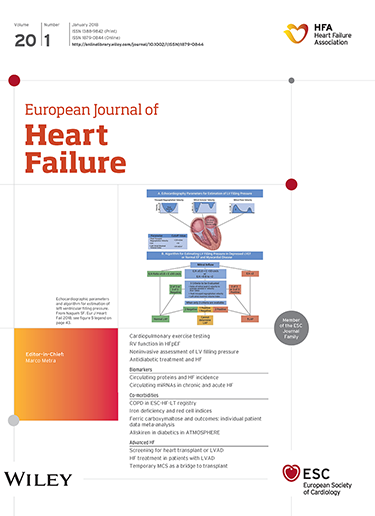Prevention of cancer therapy-related cardiac dysfunction and heart failure in cancer patients and survivors. A Clinical Consensus Statement of the Heart Failure Association, the European Association of Preventive Cardiology of the ESC, and the ESC Council of Cardio-Oncology.
IF 10.8
1区 医学
Q1 CARDIAC & CARDIOVASCULAR SYSTEMS
引用次数: 0
Abstract
Despite advances in cancer treatments with significant improvement in patient outcomes, chemotherapy, targeted molecular therapies and radiotherapy may cause a range of cardiovascular complications, such as cancer therapy-related cardiac dysfunction (CTRCD), which represents a broad spectrum of possible presentation and aetiological link with the broad scope of various cancer therapies, including chemotherapy, targeted agents, immunotherapies, and radiation therapy, aiming at reducing the associated morbidity and mortality. However, practical guidelines on the primary prevention of CTRCD in high-risk patients, a key element in improving prognosis, are lacking in cancer patients and related evidence remains inconclusive. This Clinical Consensus Statement, authored by experts from the Heart Failure Association (HFA) and the European Association of Preventive Cardiology (EAPC) of the European Society of Cardiology (ESC), and the ESC Council of Cardio-Oncology, aims to discuss the definition and epidemiology of CTRCD, the implicated factors for risk stratification, and the appropriate early diagnostic pathways, while focusing on lifestyle modifications, and pharmacological interventions to reduce the incidence of CTRCD. In addition, a holistic cardio-oncology management approach is advised for prevention and long-term management.预防癌症患者和幸存者与癌症治疗相关的心功能障碍和心力衰竭。心力衰竭协会、ESC欧洲预防心脏病学协会和ESC心脏肿瘤委员会的临床共识声明。
尽管癌症治疗取得了进展,患者的预后得到了显著改善,但化疗、靶向分子治疗和放疗可能导致一系列心血管并发症,如癌症治疗相关性心功能障碍(CTRCD),它代表了广泛的可能表现形式和病因学联系,与各种癌症治疗,包括化疗、靶向药物、免疫治疗和放射治疗。旨在降低相关的发病率和死亡率。然而,在癌症患者中缺乏对高危患者进行CTRCD一级预防的实用指南,这是改善预后的关键因素,相关证据仍不确定。这份临床共识声明由心衰协会(HFA)和欧洲心脏病学会(ESC)的欧洲预防心脏病学会(EAPC)以及ESC心脏肿瘤学委员会的专家撰写,旨在讨论CTRCD的定义和流行病学,风险分层的相关因素,以及适当的早期诊断途径,同时关注生活方式的改变。以及药物干预以降低CTRCD的发生率。此外,建议采用全面的心脏肿瘤学管理方法进行预防和长期管理。
本文章由计算机程序翻译,如有差异,请以英文原文为准。
求助全文
约1分钟内获得全文
求助全文
来源期刊

European Journal of Heart Failure
医学-心血管系统
CiteScore
27.30
自引率
11.50%
发文量
365
审稿时长
1 months
期刊介绍:
European Journal of Heart Failure is an international journal dedicated to advancing knowledge in the field of heart failure management. The journal publishes reviews and editorials aimed at improving understanding, prevention, investigation, and treatment of heart failure. It covers various disciplines such as molecular and cellular biology, pathology, physiology, electrophysiology, pharmacology, clinical sciences, social sciences, and population sciences. The journal welcomes submissions of manuscripts on basic, clinical, and population sciences, as well as original contributions on nursing, care of the elderly, primary care, health economics, and other related specialist fields. It is published monthly and has a readership that includes cardiologists, emergency room physicians, intensivists, internists, general physicians, cardiac nurses, diabetologists, epidemiologists, basic scientists focusing on cardiovascular research, and those working in rehabilitation. The journal is abstracted and indexed in various databases such as Academic Search, Embase, MEDLINE/PubMed, and Science Citation Index.
 求助内容:
求助内容: 应助结果提醒方式:
应助结果提醒方式:


